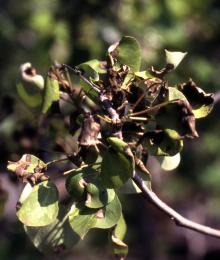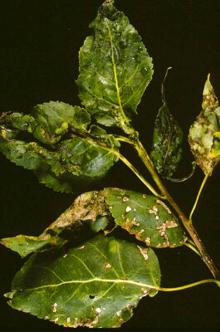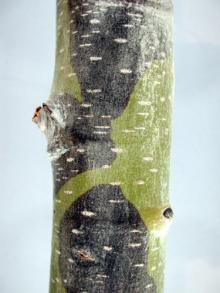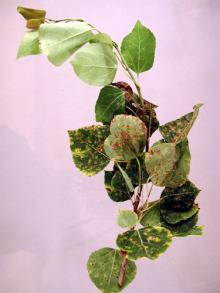Cause Pseudomonas syringae pv. syringae, and/or P. s. pv. populus, bacteria. This is one of the limiting factors in seedling production in the Pacific Northwest. Fluctuating temperatures at or below freezing can intensify symptoms. The disease has been attributed to frost damage in the past. Although the bacteria survive on the outside of the plant they must get inside and multiply in the space between plant cells (apoplast) to cause disease. These pathogenic bacteria inject several proteins and small-molecule toxins to get past host immune mechanisms. Once inside, the bacteria induce a watery, nutrient rich environment between the plant cells where they can multiply and continue colonization of the plant tissues. These bacteria also produce a protein that acts as an ice nucleus, increasing frost wounds that bacteria easily colonize and expand.
Symptoms Dark brown, necrotic leaf spots and shoot dieback.
Cankers with longitudinal cracks also can develop on the south side of trunks and branches. An exudate may be found dripping down damaged stems. Bark near the canker has a papery, glassy appearance. The vascular cambium is discolored beyond the cankered area but does not extend into the roots.
Can also inhibit seed germination.
Cultural control
- Space plants for good air circulation.
- Protect from weather extremes. Plastic shelters have been as good as or better than chemical methods against the same disease on other crops.
Chemical control Fixed coppers may help. Use the following on a few plants and observe for phytotoxicity before general use. Copper resistance is widespread in many regions.
- Junction at 1.5 to 3.5 lb/A. Group M1 + M3 fungicide. 48-hr reentry.
- Phyton 27 at 1.5 to 3.5 oz/10 gal water. Group M1 fungicide. 48-hr reentry.
Reference Saint-Vincent, P., Ridout, M., Engle, N. L., Lawrence, T. J., Yeary, M. L., Tschaplinski, T. J., Newcombe, G. and Pelletier, D. A., 2020. Isolation, characterization, and pathogenicity of two Pseudomonas syringae pathovars from Populus trichocarpa seeds. Microorganisms, 8:1137.





